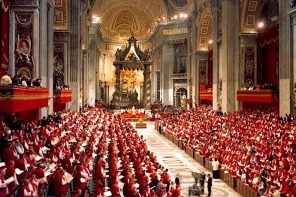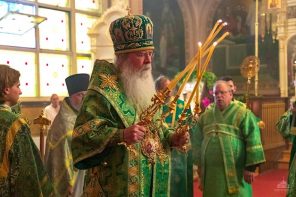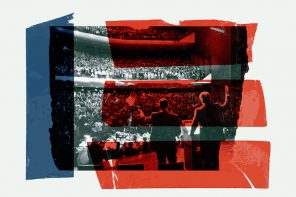Here at the Faith and Freedom Coalition Conference, a couple of reporters wondered aloud to me where all the religion was. And I thought to myself, it was everywhere.
First, the Faith and Freedom name plays right into the idea, a cornerstone of religious right activism, that “faith” and “freedom” are inextricably linked; that America is a Christian nation whose founders escaped religious persecution (true) but that their descendants’ freedom of religion has been curtailed by secularists who invented separation of church and state and seek to restrain evangelism (which is equated with “religious freedom”) by allowing gay marriage or other legislation conservative evangelicals disagree with (not true). Being able to practice your “faith” (i.e., demand that government legislate morality based on your faith) is freedom, in this view, which is a driving force of the religious right.
That’s why Tim Goeglein, formerly of the Bush White House and now with Focus on the Family, implored his audience here to sign the Manhattan Declaration. (It is based on, he said, the recognition that religious liberty is our “first freedom.”) Or why Newt Gingrich referred derisively to “secular, anti-American values.” To Gingrich, those “secular” values represent the curtailment of (religious right) religious freedom.
The your-rights-infringe-on-my-religious-freedom argument is the main one you’d hear from an opponent of gay marriage, say. And there was a bit of that talk here today, but not as much as I suspect we’ll hear next week at the Values Voters Summit. Here, I heard a lot of talk about economic freedom, the supposedly free-spending, monstrous, socialist government, and about the wonders of free enterprise. Most people hear that, and they think, what happened to the God talk? These people must be trying to appeal to the largely secular tea parties.
But it’s there. While many tea partiers might come to a rally with an entirely secular objection to what they call “big government” or “socialism” or whatever, for a lot of their allies in the religious right, there’s a religious reason. Richard Land, head of the Ethics and Religious Liberty Commission of the Southern Baptist Convention, spoke of it today when he said, citing Romans 13, that there are “only three divinely ordained institutions: home, church, and civil government,” which is “ordained by God to punish those who do wrong and reward those who do that which is right.” In the religious right and for some tea partiers, that “limited” sphere of authority for government is exceeded by, say, passing health care reform.
When Virginia Governor Bob McDonnell, speaking to this same audience, called “limited government,” along with “traditional values,” and “fiscal responsibility” the “birthright of this nation,” he was tying those concepts back to one that many speakers, including Reed and Gingrich, emphasized today: that not only did God ordain a limited role for government, God, and not the government, is the source of individual rights. “God gives you sovereignty,” said Gingrich, and “the government doesn’t define rights.” In other words, if the government tells you to buy insurance under the individual mandate, it’s not only infringing on your God-given rights, but exceeding its authority granted by God. (I’m not defending this argument, obviously, just explaining it. You can read more in this piece Julie and I wrote about how this argument is used to promote the idea of militias — one of the many ways the “government exceeds its God-given authority” argument is made.)
Reed talked about how God granted people certain rights, and that “people have the right and duty to overthrow that government, by force if necessary,” if it violates those rights. Reed was quick to add that he wasn’t advocating a government overthrow (although it surely sounded like it!), saying that he just wanted people to go out and vote in the mid-terms. That idea of America — the America that McDonnell described as founded at Virginia Beach when colonialists planted a cross in the sand and said “we claim this land for Christ” — is the “most radical idea since the Gospel,” said Reed.
Tea party events don’t necessarily emphasize this view — although many people who speak at tea parties do. And as Michelle Tennery, an activist who told me she’s been at every D.C. tea party event since the 2009 tax day protests, observed, tea parties don’t have “a religious fervor” but “that’s not to say that people there aren’t motivated by that.”




